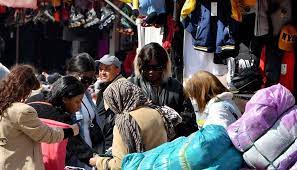Irregular Africans Leave Tunisia to Escape Attacks

A number of irregular sub-Saharan African migrants have begun leaving Tunisia amid reports of escalating attacks against them since controversial statements made by President Kais Saied about the resettlement plot. Observers, on the other hand, believe that this matter is exaggerated and that the attacks against Africans are individual and unsystematic.
The head of Guinea-Bissau’s military junta, Colonel Mamadi Doumbouya, received on Wednesday around 50 of his compatriots on their return from Tunisia aboard a government-chartered plane to evacuate them from the Arab country.
This is the first evacuation of its citizens from Tunisia organized by the Guinean government since Saied’s speech a week ago in which he called for “urgent measures” against African migrants residing irregularly in his country.
The presence of these irregular migrants in Tunisia is a source of “violence and crime” and part of a “criminal arrangement” aimed at “changing Tunisia’s demographic makeup,” Said said.
“Once the plane landed at Conakry airport, the returnees, including women carrying their babies, disembarked.”
One of them is Marito Diallo, whose baby on her arm said, “I had gone to give birth when this problem started. In the hospital (in Tunisia) we felt hatred and rejection against us.”
Guinea’s health system suffers from many problems as a result of years of mismanagement by successive authorities. In contrast, Tunisia is a destination for many foreigners seeking good medical care.
Fear of attacks
While there are no reports of an increase in attacks against sub-Saharan Africans, this does not prevent fears of attacks by some youth, in return for the Tunisian president’s emphasis on the need to protect Africans from violence in an attempt to reassure them.
The young mother added that accompanying her on this recovery trip “came hastily to take me to the hospital even before the end of my stay. “Along the way, we survived two attacks while my baby was in my hands.”
Forty-one-year-old Agassimo Sangari said he was in Sfax (central-eastern Tunisia) and wanted to “cross (the sea) to go to Italy, but the anti-black feeling pushed me to go to Tunis.”
He said he traveled from Sfax to Tunis in a car with two Tunisian women.
“On the way, I was about to be killed at a roadblock set up by unsuspecting young men,” he said. These two Tunisians saved my life because they woke up.”
On the other hand, a number of African officials in Tunisia have appeared in YouTube videos confirming that there is a campaign against Tunisia, and that the attacks are not widespread, they are individual attacks.
These Africans have criticized some of the abuses and abuses carried out by their irregular compatriots, which have caused resentment in Tunisia.
For his part, Guinean Foreign Minister Morissanda Kouyaté said that the plane his government had chartered, which went to Tunisia with its citizens wishing to leave, returned 49 Guineans to their country.
He added that the government will set up an air bridge between Conakry and Tunisia to bring back anyone who wants to leave Tunisia.
According to a police official, the returnees include “children under 10 years of age and babies”.
The Guinean presidency had said in a statement that the minister had been sent to Tunisia on a plane chartered by the ruling junta “to urgently go and help the Guineans”.
Ivory Coast said Wednesday it had begun “repatriation operations” from Tunisia for some 500 citizens.
“The most urgent thing is to save lives and prevent injuries,” Ivorian government spokesman Amadou Coulibaly said after a cabinet meeting, noting that such return flights could take place within 24 to 72 hours.












